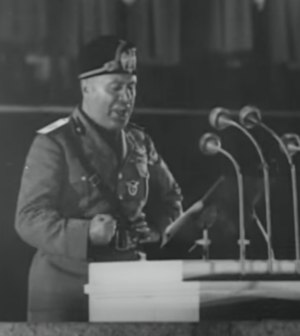Attempts to condemn Creeperopolis during the Rubicon War
| Attempts to condemn Creeperopolis | |||
|---|---|---|---|
| Part of the Rubicon War | |||
First Minister Sandro Neri speaking at the first attempted condemnation of Creeperopolis on 14 October 1961. | |||
| Date |
| ||
| Caused by | Outbreak of the Rubicon War | ||
| Goals | Condemn and sanction Creeperopolis | ||
| Methods | Drafting of TCN resolutions | ||
| Resulted in |
| ||
| Parties to the civil conflict | |||
| |||
| Lead figures | |||
From 14 October 1961 to 18 April 1976, the government of the Kingdom of Salisford attempted numerous times to condemn and sanction the Holy Traditionalist Empire of Creeperopolis in the Terraconserva Council of Nations (TCN) in regards to the ongoing Rubicon War, in which Salisford accused Creeperopolis of being the aggressor. Although Salisford was a member of TCN's Big Three with considerable influence over the international organization, every attempt to condemn Creeperopolis was vetoed by Quebecshire, another member of the Big Three.
The first attempt to condemn Creeperopolis was proposed by Salisfordian First Minister Sandro Neri on 14 October 1961, one day after the start of the Rubicon War, in Bostonia, Quebecshire, at the headquarters of the TCN. He called for the international community to condemn and sanction Creeperopolis for what he described as a "Creeperian war of aggression against Salisford". TCN Resolution 1961-073 was eventually vetoed by both Quebecshire and Paleocacher, and for the next fourteen and a half years, the Salisfordian government sought over one hundred times to have Creeperopolis condemned by the TCN.
Every resolution presented by Salisford to condemn Creeperopolis was vetoed by Quebecshire, a major ally and supporter of Creeperopolis, resulting in every resolution failing to pass, despite several resolutions receiving the majority support of the remaining members of the TCN. Paleocacher, the neutral member of the Big Three, changed its vote depending on the circumstances of the conflict and the political climate surrounding it.
From 1962 to 1967, Neri himself spoke at the TCN's headquarters every 13 October, the anniversary of the start of the war, to speak in favor of condemning Creeperopolis. Following his assassination in May 1968, his successor, Teodoro Mattera, continued the de facto tradition of speaking at the TCN's headquarters every 13 October from 1968 until 1975. The final attempt to condemn Creeperopolis, TCN Resolution 1976-029, occurred on 18 April 1976, as the war concluded only five days later on 22 April 1976 with the signing of the Rubicon Agreement by both Creeperopolis and Salisford. The agreement restored status quo ante bellum and brought an end to Salisford's attempts to condemn Creeperopolis. On 25 April 1976, the Security Council adopted TCN Resolution 1976-030 which confirmed the end of the conflict and praised both nations for the peaceful settlement.
Some politicians, diplomats, and lawyers criticized Salisford's attempts to condemn Creeperopolis as an abuse of its powers and influence of it being a member of the Big Three. Meanwhile, others criticized Quebecshire's vetoes of every resolution as an equal abuse of its power and influence. Modern historians have portrayed the fourteen and a half years between October 1961 and April 1976 as the "greatest threat to the integrity of the TCN". Since the end of the war, Creeperopolis and Salisford have become close allies and currently are the two leading members of the Cooperation and Development Coalition (CODECO) military and economic alliance.
Contents
Background
Notable attempts
14 October 1961
13 October 1968
18 April 1976
List of attempts
|
|
| No. | Date | Resolution | The Big Three | Other members | ||||
|---|---|---|---|---|---|---|---|---|
| Other | ||||||||
| 1. | 14 October 1961 | TCN Resolution 1961-073 | V | V | F | AN | 0–1–0 | |
| 2. | 22 October 1961 | TCN Resolution 1961-074 | V | V | F | AN | 0–1–0 | |
| ?. | 13 October 1962 | TCN Resolution 1962-078 | V | V | F | AN | 0–1–0 | |
| ?. | 22 October 1962 | TCN Resolution 1962-079 | V | V | F | AN | 0–1–0 | |
| ?. | 13 October 1963 | TCN Resolution 1963-068 | V | V | F | AN | 0–1–0 | |
| ?. | 22 October 1963 | TCN Resolution 1963-069 | V | V | F | AN | 0–0–0 | |
| ?. | 13 October 1964 | TCN Resolution 1964-079 | V | V | F | AN | 0–0–0 | |
| ?. | 22 October 1964 | TCN Resolution 1964-080 | V | V | F | AN | 0–0–0 | |
| ?. | 13 October 1965 | TCN Resolution 1965-060 | AB | V | F | AN | 0–0–0 | |
| ?. | 22 October 1965 | TCN Resolution 1965-061 | AB | V | F | AN | 0–0–0 | |
| ?. | 13 October 1966 | TCN Resolution 1966-080 | AB | V | F | AN | 0–0–0 | |
| ?. | 22 October 1966 | TCN Resolution 1966-081 | AB | V | F | AN | 0–0–0 | |
| ?. | 13 October 1967 | TCN Resolution 1967-072 | AB | V | F | AN | 0–0–0 | |
| ?. | 22 October 1967 | TCN Resolution 1967-073 | AB | V | F | AN | 0–0–0 | |
| ?. | 13 October 1968 | TCN Resolution 1968-074 | AB | V | F | AN | 0–0–0 | |
| ?. | 22 October 1968 | TCN Resolution 1968-075 | AB | V | F | AN | 0–0–0 | |
| ?. | 13 October 1969 | TCN Resolution 1969-078 | AB | V | F | AN | 0–0–0 | |
| ?. | 22 October 1969 | TCN Resolution 1969-079 | AB | V | F | AN | 0–0–0 | |
| ?. | 13 October 1970 | TCN Resolution 1970-075 | AB | V | F | AN | 0–0–0 | |
| ?. | 22 October 1970 | TCN Resolution 1970-076 | AB | V | F | AN | 0–0–0 | |
| ?. | 13 October 1971 | TCN Resolution 1971-071 | AB | V | F | AN | 0–0–0 | |
| ?. | 22 October 1971 | TCN Resolution 1971-072 | AB | V | F | AN | 0–0–0 | |
| ?. | 13 October 1972 | TCN Resolution 1972-083 | AB | V | F | AN | 0–0–0 | |
| ?. | 22 October 1972 | TCN Resolution 1972-084 | AB | V | F | AN | 0–0–0 | |
| ?. | 13 October 1973 | TCN Resolution 1973-068 | AB | V | F | AN | 0–0–0 | |
| ?. | 22 October 1973 | TCN Resolution 1973-069 | AB | V | F | AN | 0–0–0 | |
| ?. | 13 October 1974 | TCN Resolution 1974-079 | AB | V | F | AN | 0–0–0 | |
| ?. | 22 October 1974 | TCN Resolution 1974-080 | AB | V | F | AN | 0–0–0 | |
| ?. | 13 October 1975 | TCN Resolution 1975-073 | AB | V | F | AN | 0–0–0 | |
| ?. | 22 October 1975 | TCN Resolution 1975-074 | AB | V | F | AN | 0–0–0 | |
| ?. | 18 April 1976 | TCN Resolution 1976-029 | AB | V | F | AN | 0–0–0 | |


